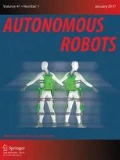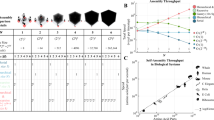Abstract
Self-reliant mobile robots have the potential to perform useful and productive work in remote and hostile environments. A colonial architecture, comprising a population of both static operations robots and modular mobile robots, enables self-reliance. Sustainability extends operational life and enables continued operation beyond disabling events. Polymorphism enables performance of multiple roles at optimal efficiency. In this paper, we present algorithms enabling fault detection, identification and rectification whilst achieving and maintaining mobile robot build orders within an error prone environment. Modules that exhibited faulty behaviour are identified and replaced. When a robot is not required then it is disassembled for storage or polymorphed into a new role. Near optimal physical graceful degradation is demonstrated on a robot module scale. The application described in this research is the automated deployment of a large scale off-world human habitat for 10 to 50 personnel from site clearing to radiation shielding.
Similar content being viewed by others
References
Agah, A. and Bekey, G. 1996. Robot colony simulator: A research tool for studying colonies of intelligent robots, Simulation, pp. 82–93.
Cohen, M. 1985. Human Factors in space station architecture I: Space Station Program Implications for Human Factors Research (NASA TM-86702).
Engwirda, A., Hitchings, M., Vlacic, L., and Sattar, A. 1998. Population of cooperative autonomous agents: preliminary consideration. In proceedings of the 8th IFAC/IFORS/IMACS/IFIP symposium on large scale systems: theory and applications, Patras, Greece.
Engwirda, A., Engwirda, T., Vlacic, L., and Sattar, A. 2000. Cooperative autonomous robot colonies. In Proceeding of the IEEE International Conference on Industrial Technology, IEEE ICIT 2000, Goa, India.
Fukuda, T. 1999. President’s Message: Addressing today’s problems in robotics and automation. In IEEE Robotics & Automation, 6(4):4–5.
Gaviraghi, G. 2002. A Modular Construction System For A Martian Manned Base. On to Mars: Colonizing a New World, Apogee Books.
Gustafson, S. and Gustafson, D. 2004. Scaling Issues with Robot Search and Tagging. In Workshop Proceedings of Self-Sustaining Robotic Systems, Robosphere 04, NASA Ames Research Centre.
Howe, A. 2004. Mobitat: Mobile Modular Habitat. In Workshop Proceedings of Self-Sustaining Robotic Systems, Robosphere 04, NASA Ames Research Centre, pp. 11–20.
Huntsberger, T., Rodriguez, G. and Schenker, P. 2000. Robotic challenges for robotic and human Mars exploration. In Proceeding Robotics2000, Albuquerque, NM, pp. 340–346.
Park, W., Albright, D., Eddleston, C., Won, W., Lee, K., and Chirikjian, G. 2004. Robotic Self-Repair in a Semi-Structured Environment. In Workshop Proceedings of Self-Sustaining Robotic Systems, Robosphere 04, NASA Ames Research Centre, pp. 77–80.
Pirjanian, P., Huntsberger, T., Trebi-Ollennu, A., Aghazarian, H., Das, H., Joshi, S., and Schenker, P. 2000. Campout: a control architecture for multi-robot planetary outposts. In Proceeding of the SPIE Symposium on Sensor Fusion and Decentralized Control in Robotic Systems III, vol 4196, Boston, MA.
Robots Rising 1998. Distributed by Arcwelder Films, appeared on Discovery Channel video, Bethesda, MD 20814.
Warwick, K. 1997. March of the machines: Why the new race of robots will rule the world, Random House, London.
Yim, M. 1994. Locomotion with a Unit-Modular Reconfigurable Robot, PhD thesis, Stanford, CA: Stanford University Dept. of Mechanical Engineering.
Author information
Authors and Affiliations
Corresponding author
Rights and permissions
About this article
Cite this article
Engwirda, A.E. Sustainable polymorphic colonial robotics and large scale off-world construction. Auton Robot 20, 137–148 (2006). https://doi.org/10.1007/s10514-006-5936-3
Published:
Issue Date:
DOI: https://doi.org/10.1007/s10514-006-5936-3




